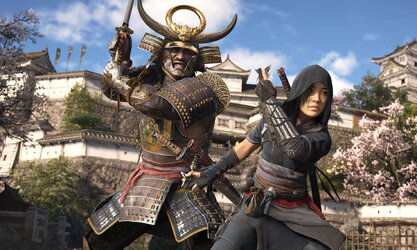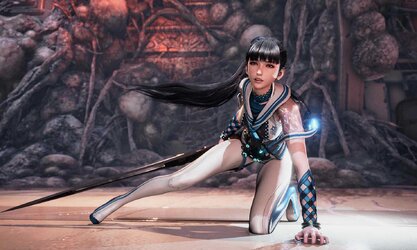
A screenshot of Assassin's Creed Shadows, which features a black samurai protagonist.

Keza MacDonald
Wed 19 Jun 2024 10.00 EDT
A few months ago I wrote about a consulting agency, Sweet Baby Inc, that found itself at the centre of a conspiracy theory: aggrieved gamers on a Steam forum had erroneously concluded that this small agency was somehow mandating the inclusion of more diverse characters in games. Depressingly but unsurprisingly, the result was a tremendous amount of targeted harassment towards the people who work at Sweet Baby and every journalist who reported on it (particularly the women). It was a disturbing echo of Gamergate, an online harassment campaign 10 years ago that initially sprung from the wild accusations of a game developer’s vindictive ex-boyfriend.
The language has changed a bit in the past decade: they used to be upset about “SJWs”, or social justice warriors, and now they’ve taken issue with a different acronym, DEI (diversity, equality and inclusion), or just good ol’ “woke”. But the sentiment from this group is the same: games are for us, and for us only, and if you want games to change, or to tell stories outside the straightforward male-oriented power fantasies that we grew up with, then, well, that’s not allowed. We won’t stand for it. In fact, we will try to aggressively harass you out of this space entirely.
Unfortunately, the anti-woke “campaigning” has not let up much in the intervening months. Led by a coterie of the usual grifters, they have taken issue with, in no particular order: the fact that Aphrodite, the literal goddess of love, is not hot enough in Supergiant’s Hades II; that female characters in recent game trailers all have “square” jaws and “masculine” bodies; that journalists gave the recent PS5 game Stellar Blade (pictured above) bad reviews because its female characters are too hot (note: they didn’t, the game has a Metacritic score of 81); that too many games feature “DEI haircuts” (that’s a fun one to interpret); and that Ubisoft was somehow forced by the shadowy forces of wokery to make the main character of its upcoming Assassin’s Creed game (pictured below) a black samurai, contradicting historical evidence. This last claim was bolstered by the King of Bad Posters himself, Elon Musk, who replied to a tweet about this manufactured outrage with “DEI kills art”.
Assassin’s Creed Shadows’ executive producer Marc-Alexis Côté addressed Musk’s tweet in an interview with Game File’s Stephen Totilo (£) last week. “It’s sad, he’s just feeding hatred. I had a lot of three word replies that came to mind,” he said. “The first thing I wanted to do was go back on X – that I had deleted – and just tweet back … What Elon says is not the game that we’re building. People will have to play the game for themselves. And if, within the first 11 minutes and 47 seconds, they are not convinced of what we’re doing, we can have the discussion.” For the record, there is plenty of historical basis for the depiction of black samurai Yasuke in the game.
Just after Summer Game Fest finished, the anti-woke gamers found a new target: a report at IGN, which credibly and comprehensively lays out a history of sexism at the developer of upcoming Planet-of-the-Apes-meets-Sekiro action game Black Myth: Wukong. The response – surprise! – was to go after the woman who wrote it, whilealso spinning up a ludicrous conspiracy theory that IGN was blackmailing the developer. You can go down a rabbit hole of quite jaw-dropping horribleness on any one of these manufactured controversies, but take it from me: it’s really not worth it.

Stellar Blade.
This reactionary under layer of gaming’s enthusiast media, which makes its home mostly on X and YouTube, does not actually have the slightest impact on how games are made, or indeed which games are made. Look at Gamergate: what did it actually achieve? Games are more diverse than they were 10 years ago, not less; I saw more non-white male faces and characters in this year’s spate of Summer Game Fest trailers and demos than at any previous time in the almost 20 years I’ve been covering games. But they can still makepeople’s online lives hell for a while. I know this because I’ve been through it, several times.
I was running the UK branch of Kotaku when Gamergate kicked off, and so I had a front-row seat for their harassment tactics, which included sending the most disgusting threats imaginable through all the online channels available to them, trying to get me fired by emailing game publishers and my bosses with dossiers of my professional misdeeds and journalistic failings (read: writing about video games from a feminist perspective), searching for my and my colleagues’ real addresses and phone numbers and family members (and posting those details to their subreddits if they found them), and putting together unhinged Google Docs with links drawn between “SJW” journalists and developers. One of these mad documents appeared briefly in a recent Netflix documentary about 4chan, prompting several of my friends to text me a screenshot asking me if I knew that I was a figure in old “alt-right” conspiracy theories. Unfortunately, yes, I did.
It’s happened again a few times since, for various reasons. Unfortunately, dealing with online mobs is a part of the job for many journalists and indeed game developers these days, and despite all the shit I’ve dealt with over the years as a woman covering video games, I’m still rather glad I don’t write about politics. But I know exactly how awful it can feel when they mobilise against you, especially if it’s the first time. They’ll search for whatever they think is the least flattering image of you on Google Images, use it as a cutout for a YouTube thumbnail image, and then rant for 10 minutes over screenshots of your articles. They’ll tweet prominent people in games, trying to get them to publicly discredit you. They’ll set their followers on you. It’s hard not to meet their manufactured rage with a lot of genuine rage of your own.
It’s tempting to dunk on these people endlessly, but outrage fuels outrage – especially now, when there is literal money to be made posting inflammatory nonsense on X or YouTube. If Gamergate proved anything, it’s that nobody has to pander to rage-baiting toxic gamers, or even listen to them. That said, I still don’t think there’s been enough public pushback against this flavour of online abuse from the biggest publishers in games over the past few months, when the consultancies they work with, the journalists and critics who cover them, and even some of their own developers have been caught in an online shitstorm. Take it from me: vocal support means a lot.
...
What to read
A really interesting, long article from Kotaku’s Kenneth Shepard on the ongoing conversation about how to depict romance in video games: should characters be “playersexual”, bending to whatever the player wants? Or does that lead to two-dimensional characterisation, especially when it comes to depicting the queer experience? I could say much more about this topic, but the article is super comprehensive, so go ahead and read it.
...
Question Block
Today’s question comes from reader Diana:
“When a game is being made, how much should developers listen to players? People who paid on Kickstarter for pre-alpha access can give feedback on what they think. Should their input essentially change the game, or only improve the game as the developer intended it to be?”
Going from what I’ve heard from developers working on Kickstarter or Early Access projects, where players are welcomed into the game long before it’s actually finished, their input is absolutely vital – as long as it’s in good faith. Developers can learn a tremendous amount from seeing how people actually play, whether that’s noting where people get stuck and levelling out the difficulty curve, seeing that elements and ideas players respond to most positively, or balancing an online multiplayer game. Sometimes, players do change a game, and usually for the better. Games such as Kerbal Space Program, Subnautica (pictured above), even Baldur’s Gate 3 benefited hugely from releasing in early access.
But should developers change a game for the players to the extent that they compromise on their original creative vision? Only if that vision just isn’t working out in reality. It’s been known to happen, especially in games, where you never really know if things are coming together until quite late in development. Generally, if a developer is being sensible, a game is pretty far along by the time it enters Early Access, or any kind of public alpha/beta test. At that point, what player data and feedback provide is an opportunity for a developer to execute that vision better.
If you’ve got a question for Question Block – or anything else to say about the newsletter – hit reply or email us on pushingbuttons@theguardian.com.
Smash JT: Former Kotaku Activist Keza MacDonald Pushes GamerGate Anti-Gamer Agenda (archive)
